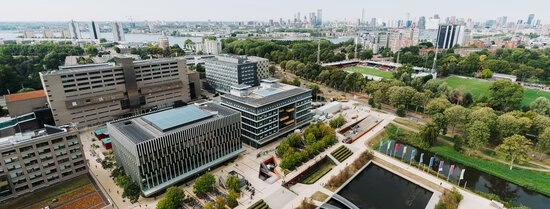The Faculty Colloquia aim to cover the broad scope of Erasmus School of Philosophy (ESPhil), in analytic and continental philosophy as well as the history of philosophy. Speakers are free in their choice of the subject-matter of their talks, but are requested to present a talk accessible to all philosophers, students notably included.
- Date
- Monday 6 May 2024, 19:30 - 21:00
- Type
- General
- Spoken Language
- English
- Room
- Het Nieuwe Instituut, Museumpark 25, 3015 CB Rotterdam
With the contingency and instability of the world as both its fuel and its justification, 'algorithmic realism' - the self-defeating utopia of substituting recursive computation for human representation on the assumption that the infinite complexity that the human mind cannot accommodate will magically be 'resolved' in algorithmic black boxes - poses an existential challenge to the survival of critique. The aims of this talk are to describe algorithmic realism as it infiltrates our techniques of signification, temporalization, power and self; expose the extent to which the shift from representation to computation disarms critique while recursively regenerating most effects of previous dominations (facticity); and to reflect on the conditions, coordinates and strategies of a new critique, more adequate to the task of countering the totalizing drives underpinning algorithmic realism and the ensuing infra-political facticity.
Drawing on Laruelle's plea against philosophical sufficiency and Moten's and others' affirmations of a negative, apophatic universality, it will be argued that liberating ourselves from algorithmic sufficiency/complacency - a precondition for the possibility of 'doing justice' to what Bernard Stiegler used to call our 'non-humanity' - is less a matter of regulation than of (social) constitutionalism. Contrary to the premises of technoreformist regulatory perspectives, the fundamental challenge that algorithmic realism poses to the persistence of critique is not so much the lack of transparency of algorithmic black boxes, but the denial of the opacity of the world itself, an ontological opacity or radical indeterminacy that forces us to speak, to convene, to imagine, to interpret in common, to take shape in the f(r)êlure (frailty/failure) through which the universality of the negative, of the non-totalisable incompleteness, manifests itself in the particular.
Bio
Doctor of Legal Sciences from the European University Institute (Florence), Antoinette Rouvroy is permanent researcher with the Belgian National Fund for Scientific Research (FNRS) at the Information, Law and Society Research Centre, Faculty of Law, University of Namur (Belgium). Her work, at the interface of legal and political philosophy, social theory, and semiotic and epistemic approaches to science and technology, concerns the evolution of forms of governmentality accompanying/propelling scientific and technological evolutions. The line of research she has been pursuing for several years concerns what she has called algorithmic governmentality - a mode of ordering the social world that no longer relies so much on law or norms as on the automated analysis of digital signals - the implications of which she studies in terms of fundamental rights and freedoms but also, more broadly, in terms of the conditions and coordinates of political and critical thought. In addition to her academic research and teaching activities, she acts as an independent expert, notably for the Council of Europe, the CNIL and the European Data Protection Supervisor's Ethics Advisory Committee.

